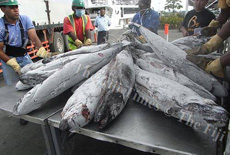NEWS: Pacific fisheries laws to benefit under ACP Fish II Programme
 SUVA, Fiji, 24 January 2012/ FT: FIJI will benefit from nine of the 26 fisheries projects that have been allocated a budget of EUR3 million ($F6.9m) under the ACP Fish II Programme.
SUVA, Fiji, 24 January 2012/ FT: FIJI will benefit from nine of the 26 fisheries projects that have been allocated a budget of EUR3 million ($F6.9m) under the ACP Fish II Programme.
The projects for the Pacific region will see Fiji specifically develop subsidiary legislation to implement fisheries legislation.
At present under implementation is a standard national monitoring control and surveillance operations manual in Fiji, Cook Islands, Niue, Tonga and Vanuatu.
The African Caribbean Pacific Group of States Fish II programme (ACP Fish II) in a statement says this manual is intended to be a reference document designed to guide monitoring control and surveillance (MCS) officers in the performance of their duties.
In the statement, the ACP Fish II said illegal, unreported, unregulated (IUU) fishing and other activities that undermined) fisheries management frameworks had the potential to "significantly erode the benefits to pacific island people associated with the harvest of oceanic fisheries".
It was also revealed that the Suva port hosted close to 150, mostly, long-line fishing vessels, of which 50 per cent are licensed to fish in Fiji waters.
"Recorded catches from this domestic fleet have increased from around 5000 tonnes in 1998 to 16,472 tonnes in 2002, of which 74 per cent was taken in the Fijian EEZ (exclusive economic zone)," the ACP Fish II stated.
It said a significant volume of tuna was transhipped in Fiji by foreign vessels, and in particular Taiwanese long-liners.
It added the subsistence fishery targeted mainly finfish, beche-de-mer, octopus, seaweed, lobster, mud crab, and various bivalve molluscs.
"These resources make a large contribution to domestic food supplies. It has recently been estimated that 50 per cent of all rural households are involved in some form of subsistence fishing and that about 22,000 tonnes of fish are landed each year.
"It is also estimated that around 1000 vessels and 2500 fishers participate in coastal commercial fishery. It is further estimated that 9320 tonnes of finfish and non-finfish – invertebrates and plants – were harvested by this component of the fishery.
"It is in this precise context that the ACP Fish II Program is implemented with a view to helping the states manage their resources better, so that fisheries continue to play these important aforementioned roles, in an international context marked by a mobilisation to fight against poverty and improve food security," it stated.
(Pictured: A significant volume of tuna was transhipped in Fiji by foreign vessels, and inparticular Taiwanese long-liners/ Jai Prasad)
– Timoci Vula, The Fiji Times
